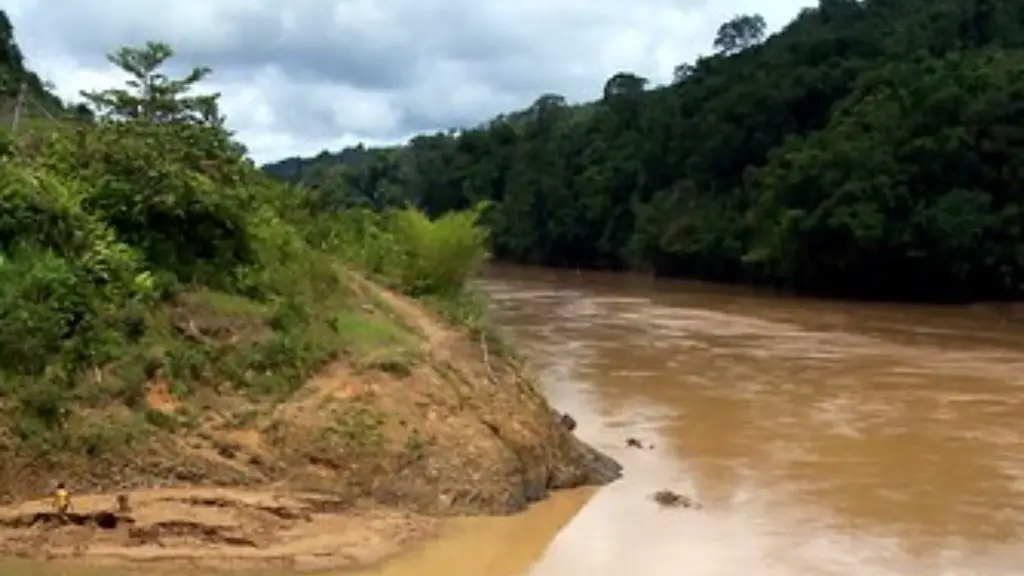The Mississippi River is one of the most powerful natural forces in America. It is a source of life, commerce, and transport and inexorably linked to Louisiana’s state identity. Its impact on the economic identity of Louisiana has been profound, with the river playing an integral role in the state’s development.
Situated on the Gulf Coast, Louisiana’s location has many advantages for trade and commerce. The Mississippi River allows for easy navigation due to its winding path and many navigable tributaries. It allows boats to move from the Gulf to the Louisiana’s interior, providing new opportunities to trade goods, transport passengers and build infrastructure. This established a crucial connection between the north and south, leading to the establishment of trading centers such as New Orleans.
The Mississippi River has also been integral in the development of Louisiana’s agricultural industry. It provides a reliable water supply for the state’s many crop plantations, including sugar cane and rice. The river also stores and transports fish and other aquatic species, allowing local fishermen to reap the rewards of the river’s bountiful fish supply. The river is an essential source of life and sustenance for many of Louisiana’s rural communities, and its impact on the state’s economic identity is undeniable.
Louisiana’s energy industry has also benefited greatly from the Mississippi River. Natural gas and oil pipelines are laid along its path, allowing large-scale energy production. Furthermore, its navigable tributaries often double as transport routes for crude oil and other hazardous materials. This helps the state to ensure its place as an integral part of the global economy.
The Mississippi River has long been an integral part of the state’s culture and history. Its winding rivers and levees have long been a part of Louisiana’s uniquely atmospheric landscape. People have long been drawn to this river, and its presence in Louisiana’s folklore and literature reflects its deep roots and importance for the people of the state.
The Mississippi River has been an essential part of Louisiana’s economic identity and will remain so for the foreseeable future. Its navigable tributaries are a lifeline to the state’s economy, while its cultural significance ensures its place in the heart of Louisiana’s citizens.
The River’s Role in Transport
The Mississippi River is responsible for some of the most efficient transportation systems in the world. Tugboats, barges, and other vessels make their way up and down the river, carrying goods and passengers. This mode of transportation is much faster and more cost-effective than traditional land-based transportation and has enabled the state’s economy to flourish.
The Mississippi River is also the longest navigable river on the continent, spanning over 2,300 miles from its source in Minnesota to the Gulf of Mexico. This expansive transportation network has proven invaluable to the state’s economy, allowing goods, services, and people to traverse the state quickly and easily.
The importance of the river for transport is further highlighted by the numerous ports that line its banks. The Port of New Orleans is the largest and busiest port in the nation, playing an essential role in Louisiana’s bustling transportation network.
Ease of access to the river also enables the state to attract businesses to Louisiana. Companies are keen to take advantage of the transport links the river offers, allowing them to transport goods quickly and cost-effectively. This has played a major part in driving economic growth in Louisiana.
Furthermore, the river has been instrumental in the development of the state’s tourism industry. Numerous cruises line the river and its many tributaries, providing tourists with the opportunity to explore the state’s unique culture and history. This influx of visitors has generated much-needed income for the state.
Increased Opportunity for Commerce
The presence of the Mississippi River has enabled Louisiana’s economy to evolve and diversify. With its navigable tributaries and easy access points, Louisiana has been able to capitalise on its advantageous position.
One of the major commercial benefits of the river is its potential for trade with other states. By linking Louisiana to the Gulf of Mexico, the river has enabled goods and services to be exchanged between states. This has created additional opportunities for commerce.
The presence of the Mississippi River has also enabled the establishment of major industries in the state. The timber industry, for example, has long been an integral part of Louisiana’s economy. The river provides a convenient transport route for logs that are then converted into timber products, such as furniture and paper goods.
Louisiana’s shipping industry has also seen significant growth in recent years. Many of the state’s ports are located along the Mississippi River, allowing for quick and easy access to the Gulf of Mexico and other states. This has enabled the state to take advantage of its ideal geographical position, capitalising on its easy access to other markets.
The Mississippi River has been a significant economic boon for the state of Louisiana. It has enabled the development of numerous industries, increased opportunity for commerce, and provided an efficient transport network. Its role in the state’s economic identity is undeniable and its impact will continue to be felt for years to come.
The Environmental Impacts of the River
The Mississippi River has been critical to the development of Louisiana’s economy and culture, however it has also had a major environmental impact. Its presence has led to changes in the dynamics of the local ecosystem and increased the risk of flooding in the area.
The river’s large-scale development has caused irreversible damage to the region’s wildlife. Its course has been altered by the construction of levees and reservoirs, resulting in a decrease in the habitat of many species. Furthermore, pollution from major industries has been known to seep into the river and its tributaries, harming aquatic life and damaging ecosystems.
The risk of flooding has also been amplified by the presence of the Mississippi River. Its flow is often constrained by levees and reservoirs, making it susceptible to sudden and extreme flooding during periods of heavy rain. This has caused devastating damage to the state’s property and infrastructure, as well as widespread economic disruption.
The presence of the Mississippi River has undoubtedly had a significant impact on Louisiana’s economic identity. While it has undoubtedly brought many benefits, it is important to remember its environmental impact. More must be done to protect our environment and balance the economic gains with ecological responsibility.
Conclusion of Infrastructure Projects
The Mississippi River is one of the most economically significant rivers in the US. Its presence has enabled Louisiana to develop infrastructure that has allowed for growth and development in the region. The completion of large-scale infrastructure projects such as ports, bridges, and levees have greatly benefited the Louisiana economy.
These projects have allowed for increased efficiency in transportation and trade, enabling the state to gain access to markets previously unavailable. This has enabled the growth of the region’s largest industries, providing a pathway for Louisiana to become an integral part of the global economy.
The completion of these infrastructure projects has had a profound effect on the state’s economy and identity. The increased level of efficiency and access to markets has allowed Louisiana to establish itself as a leader in industry, trade, and tourism. This has ensured the state’s economic longevity and prosperity.
The impact of the Mississippi River on Louisiana’s economic identity is undeniable. Its presence in the state’s history and its role in the development of infrastructure have been instrumental in the state’s economic growth. While its environmental impact must be taken into consideration, the Mississippi River will remain an integral part of Louisiana’s economic identity for years to come.
Tourism and Leisure
The Mississippi River has been integral to the development of Louisiana’s tourism and leisure industry. One of the main attractions of the river is its scenic beauty, with its massive meanders and winding rivers offering unique views of the state. This has attracted visitors from across the globe, eager to experience its unique beauty.
The state’s leisure and tourism industry has greatly benefited from the presence of the Mississippi River. Numerous fishing charters operate out of the state’s ports, taking anglers out to explore the region’s plethora of fish and aquatic animals. The river’s natural beauty also draws many visitors, with its banks providing the perfect spot for a picnic or a relaxing stroll.
The river also plays an integral role in the state’s lively music scene. Louisiana’s river ports are known for their rich musical traditions, with myriad bands performing in the many bars and clubs lining the banks. These musical offerings draw large crowds, injecting much-needed life into the local economy.
The impact of the Mississippi River on the state’s tourism and leisure industry is undeniable. Its presence has allowed Louisiana to capitalize on its unique beauty, establishing itself as one of the leading tourist destinations in the US. The river’s role in Louisiana’s economy will remain essential for many years to come.
Political and Social Implications
The presence of the Mississippi River has had a major impact on the state’s political and social structure. It has long been a major force in politics, as it has allowed for increased interaction between states. The river has served as a way to bring Louisiana into the political conversations of its surrounding states, allowing it to be seen and heard on the national stage.
The river has also been an important source of food and sustenance for many of the state’s poorer communities. It provides a secure food supply, as well as materials for the construction of shelters, boats, and other goods. This has helped to ensure the wellbeing of many of Louisiana’s low-income residents and has helped to reduce inequality in the state.
The Mississippi River also plays an important role in the state’s social identity. It has long been a symbol of Louisiana’s vibrant culture and its importance to the state’s citizens is undeniable. Its presence in the state’s folklore and literature reflects its importance to the people of the state and its impact on the state’s collective identity is unshakable.
The presence of the Mississippi River is inextricably linked to Louisiana’s economic identity. Its navigable tributaries and easy access points have enabled the state to take advantage of its prime geographical location, generating significant economic benefits. Furthermore, its presence has contributed to the state’s political and social structure, helping to reduce inequality and foster a sense of pride in the state’s citizens. Its impact on Louisiana’s identity is undeniable and its invaluable presence in the state will remain for many years to come.





